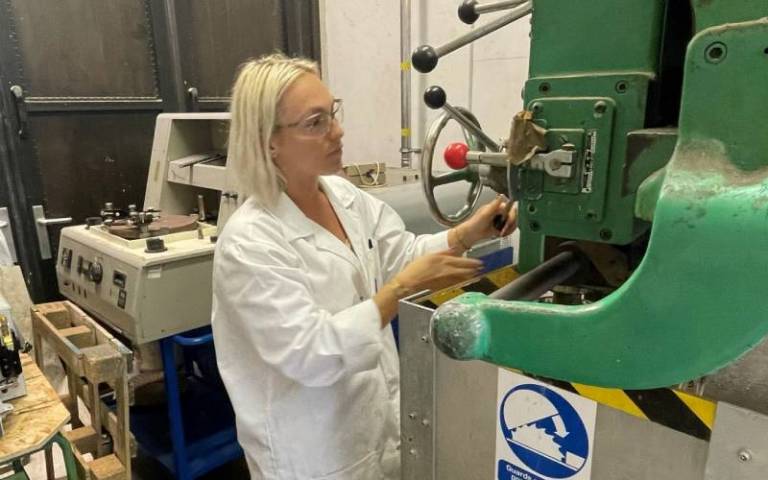Postgraduate (MSc) Innovation and Enterprise Prize Competition Awards
20 December 2022
Many congratulations to Danica Davis, MSc Geosciences student, who is the second place winner of the 2022 MAPS Faculty Postgraduate (MSc) Innovation and Enterprise Prize Competition 2022.

Image: Analysing the drill cores stored in the core library at the University of Iceland's Research Centre in Breiðdalsvík.
"INVESTIGATING CARBON MINERALISATION STORAGE POTENTIAL IN SW ICELANDIC BASALTIC FORMATIONS"
The 2022 Postgraduate Innovation and Enterprise second place prize was awarded to Danica Davis (UCL Earth Sciences). The winning projects were deemed to have an outstanding innovative aspect and a potential economic and societal impact. The competition aimed to motivate entrepreneurial spirit among the students.
“The MAPS competition has encouraged me to think about the global impacts of my research, as understanding the mechanics of carbon mineralisation in basalt will determine how it can be expanded to different basalt provinces in the future."
Danica's supervisor Professor Tom Mitchell said:
"I was delighted that Danica won a MAPS Innovation and Enterprise prize, and exciting scheme designed to recognise the impact of research students work in the real world. Dani’s excellent masters project collaborated with industry and focussed on estimating the storage capacity of basaltic rocks in SW Iceland for the use of a technology that captures CO2 and turns it permanently into stone underground within two years of injection (https://www.carbfix.com). Danica developed and implemented methodologies for automating the estimation of storage capacity in newly identified CO2 storage reservoirs from imaged drilled rock cores she took on fieldwork in Iceland, calibrating her digital image analysis with laboratory measurements at UCL Earth Sciences. These cores were taken from locations that are designed to test the applicability of the method by facilitating CO2 mineral storage in water-scarce environments as well as coastal regions, and offshore where the largest CO2 storage potential may lie. Danica was a pleasure to work with, and the prize is well deserved!"
In her response to being awarded the prize, Danica said:

Image: At UCL, Earth Sciences in Rock and Ice Physics laboratory.
“For my Masters research project I studied basaltic bedrock in Iceland for its use in carbon capture & storage. An Icelandic company, Carbfix, have developed a technology where carbon dioxide is injected into naturally reactive mafic rock where it is mineralised and stored as solid carbonates, with negligible risk of leakage. I went University of Iceland's Research Centre, Gamla Kaupfélagið, to analyse 3 drill cores from SW Iceland where the next CO2 injections are set to take place.
I used high resolution images of drill core, which were processed using MATLAB, to estimate the porosity of the core at different depths. I also performed experiments to determine the effective porosity and permeability of the core at specific depths. Using this information, we can map these properties in the subsurface and predict how CO2 may be stored once it is injected, and what effect it will have on the permeability of the rock. This is important as the porosity and permeability of the rock determines how much CO2 can be stored.
 Close
Close


